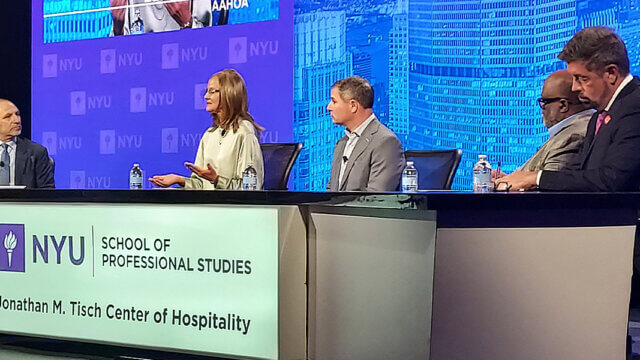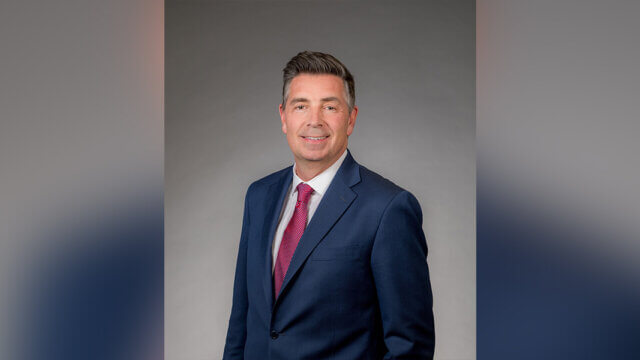NEW YORK—During the inaugural NEXT Virtual session, “Hospitality in the Time of Coronavirus: Solutions for Our Industry,” industry leaders gathered online to discuss strategies to navigate the current social and economic climate.
The virtual conference included more than 400 registered attendees and roughly $1,500 was raised for Hospitality Cares. Those interested can still make donations at https://hospitalitycares.org/.
The coronavirus pandemic has brought a great deal of uncertainty, and hoteliers are presented with not only new challenges, but an unclear recovery timeline. Moderated by Christina Trauthwein, editor-in-chief of Hotel Business and InspireDesign, these hospitality professionals gave insight on the CARES Act, offered ways to mitigate financial risks and discussed marketing and advocacy efforts.
“Initially, we were expecting a relatively V-shaped recovery; now, it’s going to be a more U-shaped or a Nike tick,” said Jamie Lane, senior director, economics and forecasting, CBRE Hotels Americas.
About two weeks ago, CBRE’s forecast called for a 37% decline in RevPAR, which is now being adjusted to about a 46% decline for the year, although he’s hopeful for 2021.
“We’ll be on the road to recovery once we get a few weeks past the number of cases peaking,” Lane said. “That is going to mean a more prolonged time at the bottom at Q2, which has caused the revision in our numbers. We do expect recovery to take hold strongly in the back half of Q3 moving into Q4, and that 2021 should be a good year for the hotel industry in terms of gains in occupancy and pulling back the declines in rates that we’re going to realize in 2020.”
Part of the industry’s resurgence will be because of the CARES Act, which Chip Rogers, president/CEO, American Hotel & Lodging Association (AHLA), believes is a lifeline package for the industry. And, although essential, he believes it is only the first step in sustaining hospitality and getting back to where the industry once was just a short month ago.
Rogers is calling for a change to the 250% of payroll to be spent over an eight-week period from the date hoteliers receive the loan, which he believes isn’t enough to both keep employees and service debt. Rogers would like that number raised to 400%, which was introduced in the original bill.
“For an average hotel, your debt service and your payroll are going to be similar,” Rogers noted. “If the owner loses his or her property, there won’t be jobs for these people to go back to. We always need to keep that in mind—debt needs to be serviced.”
Secondly, Rogers is looking for a change to the loan forgiveness timeline. The formula for the loan forgiveness is the number of employees a company has on FTE on Feb. 15 compared to the number of employees it has on FTE June 30. If the company goes down on FTE, then a portion of the loan will not be forgiven, and it will be treated as a loan.
“We believe that extending that June 30 date out closer to the end of the year makes a lot of sense because no one reasonably expects that the hospitality industry is going to be back up on its feet by June 30 at 100%,” Rogers said.
Although no one really knows when that recovery date will be, until that time, the leaders suggested some practical plans to put in motion now.
Jim Butler, partner, chairman, global hospitality group, JMBM, suggested that hotel owners familiarize themselves with the possible legal implications with the lender, franchisor, operator and with employees. And, if a hotel decides to close its doors, that comes with its own host of implications.
“The real key is whether you’re a lender or a borrower; the first thing you need to do is a comprehensive situation analysis,” Butler said. “Look at the borrower, the property, the cashflow, the operator, the manager, and different factors will suggest different scenarios. You have to be proactive. As an owner or borrower, you want to go to your lender, show your lender that you are a responsible borrower, show the lender that you know what to do. Work out cash flows and various scenarios.”
Harry Spirides, president, Spirides Hospitality Finance Company, offered other tips for managing finances.
“Ask your lender to modify your loan terms and to make them more favorable, defer loan payments three-six months, bring in a new partner to infuse cash, file for a Chapter 11 reorganization of your debt; the CARES Act made it cheaper and quicker to file Chapter 11. Lease your hotel out to the government or hospital for emergency use. Ask your hotel franchise and management company to reduce fees,” Spirides said.
Others suggested some marketing tactics to employ during this time—especially with the majority of Americans unable and unsure when their next travel experience will be.
“This is the time to get creative. If you stop marketing altogether, you aren’t going to come out of this successfully,” said Melissa DiGianfilippo, co-founder/president of public relations, Serendipit Consulting.
She suggested creating virtual experiences for guests like cooking classes, spa demos and property tours, or creating postcard-style filters and frames on social media.
“People are looking for content to share; they’re on their phones now more than ever,” she said. “Share positive press. You need to keep your brand name in the press. People are watching and looking for positive stories.”
Look for complete coverage in the upcoming April 21 issue of Hotel Business.
Join us for another virtual conference, the next event in the NEXT Virtual series, in partnership with Hotel Business and InspireDesign, on April 30th. This discussion will focus on how consumer behavior and demands related to personal well-being when traveling will evolve post COVID-19. How should the design and supply industries, and owners and project developers, be thinking about this need now? We’ll be following up with everyone who participated today with details on panelists and topics. Mark your calendars.



